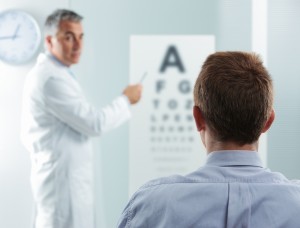What is the Difference between an Optometrist and an Ophthalmologist?
Optometrists:
Doctors of optometry are trained to detect vision problems caused by abnormalities of the eye, and issue prescriptions for lenses that can correct those problems. They also test for glaucoma and other eye diseases, referring patients to ophthalmologists and other health practitioners as needed. They may administer drugs to patients to help assess vision problems and treat some eye diseases. Optometrists also provide care before and after surgery to patients who undergo surgery for eye health issues such as cataract removal or laser-vision correction.
Optometrists are not required to have a medical degree, and therefore, cannot perform surgery themselves. Optometrists typically complete four years of college before attending an accredited optometry school for another four years. All states require that optometrists be licensed, and they must pass written and clinical examinations administered by the National Board of Examiners in Optometry.
Ophthalmologists:
Ophthalmologists are the most highly trained eye-health professionals. Ophthalmologists are physicians who can perform surgery or diagnose and treat any illness or injury of the eye. They also perform vision tests and prescribe corrective lenses. An ophthalmologist is a medical doctor who not only dispenses glasses and contact lenses, but can treat eye disease and perform surgery as well.
Ophthalmologists complete four years of college followed by four years of medical school. They must have at least one year of general clinical training and three years of residency in a hospital’s eye-health program. That adds up to 12 years of training in comparison to 8 years for an optometrist.
Who should you see?
In general, you can see either an optometrist or an ophthalmologist to have your vision checked and get a prescription for corrective lenses. However, if you are concerned about contracting an eye disease like glaucoma or cataracts, you should see an ophthalmologist. Refractive surgeries such as LASIK, PRK, ICL, or the Refractive Lens Exchange procedure are only performed by ophthalmologists. Children younger than age 3 should see an ophthalmologist if they show signs of eye disorders such as strabismus (crossed eyes), amblyopia (lazy eye) or ptosis (drooping of the upper eyelid).

Share This